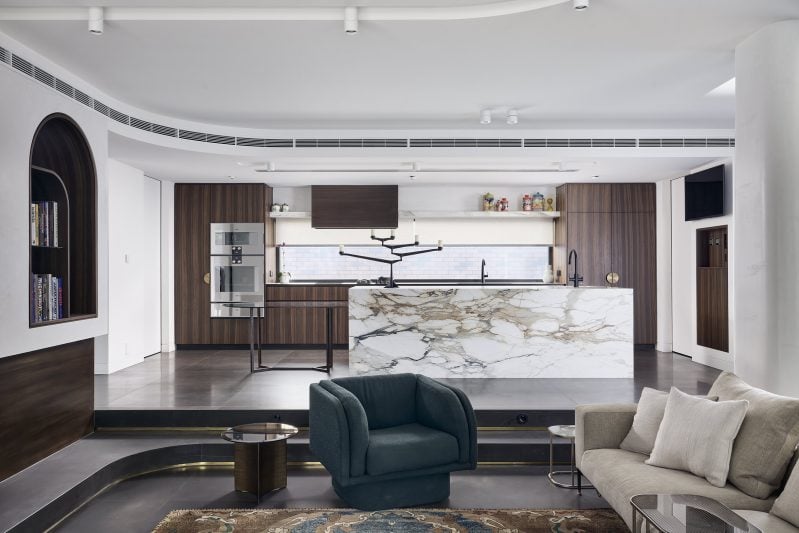
BENCHTOP DESIGN AND EDGE PROFILES YOU SHOULD KNOW ABOUT
One commonly overlooked aspect of porcelain benchtops is that the pattern you see on the surface does not continue through the biscuit of the slab like natural stone or sintered stone. With this in mind, you may be wondering what edge profiles are achievable.
12mm edge profiles
A minimal thickness of 12mm provides a clean and modern look that is fitting in many of today’s home designs. The standard 20mm thickness known to natural stones offers a variety of edge profiles that are also available in porcelain as illustrated below. Remember that the more you cut or round the edge, the less visible it will be when looking directly from the front. Rounded edges and bullnose are perhaps the most popular and commonly used edge profiles. Bullnose is seen as a traditional design that is easy to lean against, while a rounded ninety degree edge creates a flattering and modern look.

Mitred edges
Mitred edges create clean, crisp 90-degree corners that allow for the appearance of a thicker edge profile. This is done by cutting two pieces of porcelain at a 45-degree angle and joining them together to create a seamless, uninterrupted flow between the two pieces. Mitred edges are a great way to showcase the beauty of porcelain, keeping in mind this process can come at extra cost.

The Top Statuario Marble Porcelain 12mm, 1620x3240mm, made in Italy
Waterfall edges
Waterfall edges create an immediate impression in kitchen designs. The porcelain spans from the benchtop down the side in one continuous flow. This dramatic design element works well for any kitchen design where a waterfall edge is desired but is perhaps most well known in modern and contemporary designs. Any porcelain slab can be used to create this look and is most effective when the pattern flows directly from one plane to the next. Depending on your design, consider if you will have two or three sides as you may need multiple pieces to create a finished look. This design can be expensive so it’s important to discuss this design consideration with your stone mason.
Overhang
Overhangs provide additional entertainment and dining options and are achievable with the strength and durability of porcelain. This type of bench design is functional and looks great in the kitchen. It’s generally accepted to extend the countertop outwards to no more than 30-45 cm depending on the design. The 12mm thickness might appear thin but with proper backing for support, porcelain is remarkably strong and will serve homeowners well once properly installed.

The Top Capraia Marble, Porcelain 12mm, 1620×3240, made in Italy
Curved Kitchen Islands
Curved kitchen islands have garnered attention for their space efficient and unique design. The curve is created either on one or both ends of the island to create either an arch or pill shape. These designs are unique, particularly when compared to the standard rectangle shape we know kitchen benches and islands tend to be. There’s also something relaxed about curved edges in home design that creates an inviting more intimate feel, which is perhaps why this design has gained popularity in recent years.

Source: Marazzi
Porcelain Benchtop Benefits
In addition to its design versatility, porcelain is an ideal benchtop material for several reasons:
- Extremely durable and scratch-resistant
- Impervious to stains, moisture, and etching
- Easy to clean and maintain
- Available in many patterns and colours
- Consistent and predictable patterning from slab to slab
- Heat-resistant
Porcelain offers several design opportunities for benchtop and kitchen island design. Whether you’re seeking modern vibes or classic elegance, porcelain truly delivers. Its designer looks and low upkeep requirements make it a top countertop choice for today’s busy lifestyles. Fabrication costs will vary depending on the complexity of the design so it’s important to discuss your options with your stonemason. Speak to us at our Balcatta showroom to learn more about porcelain and how we can work with your stonemason for your next project.
